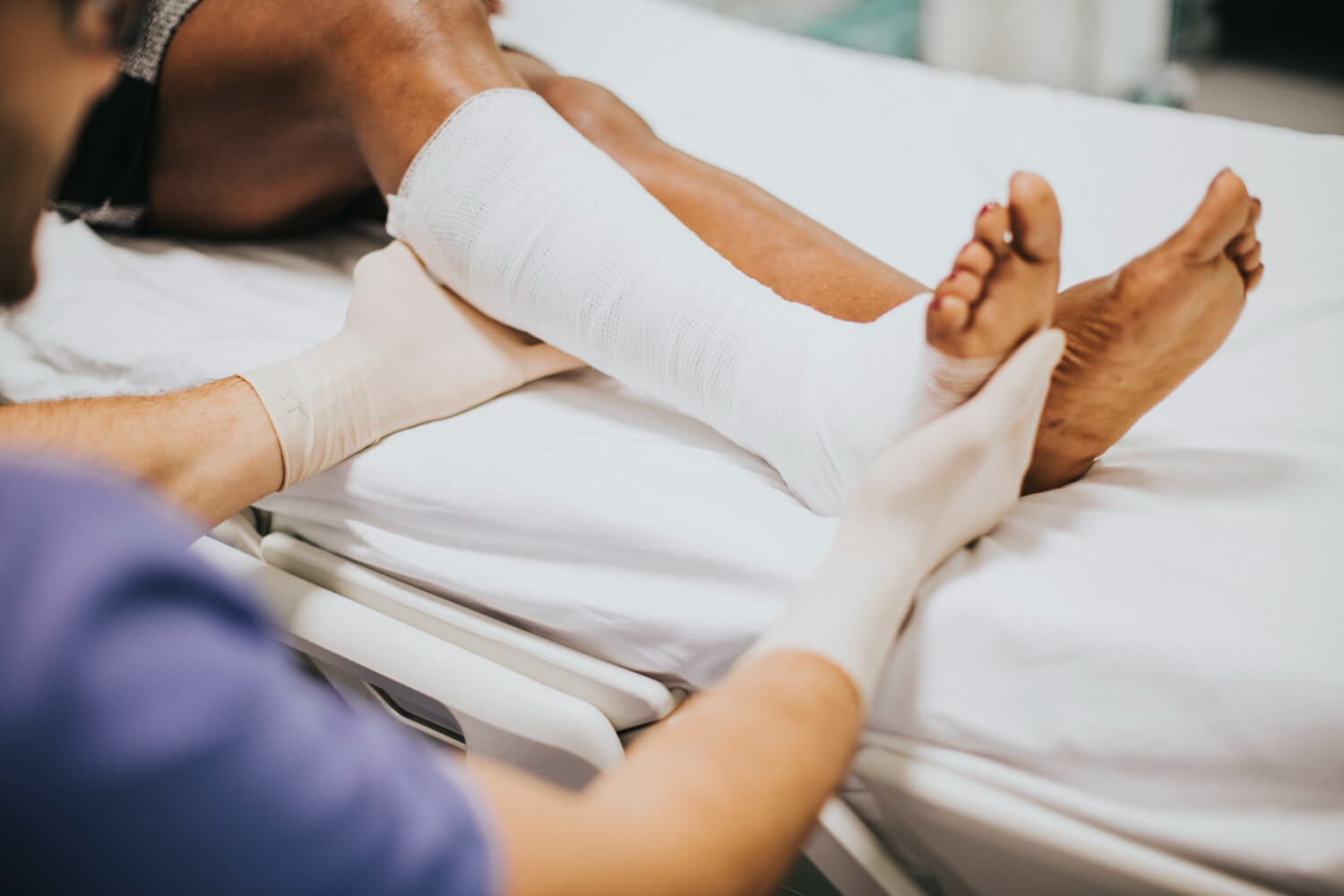Introduction
Dr. Nick Argerakis, a highly skilled and board-certified foot and ankle surgeon, brings years of experience in treating complex foot injuries. He is known for his expertise in performing Lisfranc injury surgery and helping patients in New Jersey achieve full recovery with personalized care.
Key Takeaways:
- A Lisfranc injury occurs when the midfoot sustains damage, such as ligament tears, fractures, or dislocations, which can significantly affect mobility.
- Severe Lisfranc injuries often require surgery to restore foot alignment and prevent complications like arthritis.
- The two main surgical options are Open Reduction and Internal Fixation (ORIF) and fusion surgery for advanced cases.
- Recovery typically takes several months, with physical therapy being a key part of restoring strength and function.
- Causes of Lisfranc injuries include high-impact trauma, sports injuries, twisting movements, or repetitive stress on the foot.
- Surgery can greatly reduce pain, stabilize the foot, and improve mobility when performed by an experienced surgeon.
- Early treatment is crucial if you experience swelling, severe pain, or trouble walking after an injury.
- Schedule a consultation with Dr. Nick Argerakis at New Jersey Foot Surgeons for expert evaluation and care at (732)-320-9173.
What Causes a Lisfranc Injury Requiring Surgery?
A Lisfranc injury often happens when the midfoot is subjected to sudden trauma or stress, which can result in damage severe enough to need surgery. Common causes include:
- High-Impact Trauma: Car accidents or falls from significant heights are major contributors to severe Lisfranc injuries. The intense force can dislocate bones, tear ligaments, or fracture the midfoot.
- Sports Injuries: Activities involving rapid direction changes or high impact, such as football, soccer, or gymnastics, increase the risk of midfoot injuries. Missteps or awkward landings can easily strain or tear the Lisfranc ligament.
- Twisting Injuries: Sudden twisting motions, like stepping into a hole or slipping while carrying weight, can cause the midfoot to bend unnaturally, leading to significant damage.
- Repetitive Stress: Athletes or individuals with physically demanding jobs may develop chronic midfoot injuries due to repetitive stress over time. While minor cases can be managed conservatively, prolonged damage often necessitates surgery.
- Pre-existing Conditions: Weak bones or joints caused by conditions such as osteoporosis or arthritis make the midfoot more vulnerable to injury, even from relatively minor incidents.
What Is a Lisfranc Injury?
A Lisfranc injury refers to damage in the midfoot, affecting the ligaments and bones that connect the forefoot to the hindfoot. These injuries are frequently caused by accidents, including falls, car crashes, or impacts during sports. The severity of a Lisfranc injury can range from ligament sprains to fractures, with more serious cases requiring surgical intervention to ensure proper healing and prevent long-term complications.
Why Is Surgery Necessary for Lisfranc Injuries?
Surgery becomes essential when Lisfranc injuries involve significant damage, such as displaced bones, torn ligaments, or joint misalignment. Without surgical correction, these injuries can lead to chronic pain, limited mobility, and the development of arthritis or deformities. Surgery helps realign the bones, repair torn ligaments, and stabilize the midfoot, ensuring proper healing and reducing the risk of future issues.
What Are the Types of Lisfranc Surgery?
The type of surgery performed depends on the severity of the injury. Open Reduction and Internal Fixation (ORIF) is commonly used to reposition and stabilize misaligned bones with screws or plates. For more severe injuries where joint cartilage is damaged, fusion surgery may be required to permanently join the bones of the midfoot. In some cases, minimally invasive surgical techniques are an option, which reduce scarring and recovery time while maintaining precision.
Who Is a Candidate for Lisfranc Surgery?
People who need Lisfranc surgery often have severe symptoms, including sharp pain in the midfoot, noticeable swelling, bruising, and difficulty walking or standing. Imaging tests like X-rays, CT scans, or MRIs often confirm the presence of ligament tears, fractures, or joint misalignment. When conservative treatments, such as immobilization or physical therapy, fail to provide relief, surgery is the next step to ensure proper healing and mobility.
How Is the Surgery Performed?
Lisfranc surgery is performed under general anesthesia and involves several critical steps. The procedure starts with the surgeon carefully making an incision to reach the injured area. They then realign any mispositioned bones and use screws, plates, or pins to secure the midfoot in place. In severe cases where fusion is needed, the surgeon removes damaged cartilage and permanently connects the affected bones.
Once the surgical corrections are complete, the incision is closed, and the foot is immobilized with a cast or boot. The procedure typically lasts 2–3 hours, depending on the complexity of the injury.
What Is the Recovery Process Like?
The recovery process after Lisfranc surgery happens in stages. Initially, the foot is immobilized in a cast or boot for 6–8 weeks, and patients are advised to avoid weight-bearing activities. Physical therapy begins once the bones and ligaments have healed sufficiently, focusing on restoring strength, flexibility, and range of motion.
It may take 6 to 12 months for a complete recovery, which depends on how severe the injury is and your overall health. Athletes may require additional time to regain peak performance.
What Are the Risks of Lisfranc Surgery?
Like any surgical procedure, Lisfranc surgery carries certain risks, including infection, nerve or blood vessel damage, persistent pain or stiffness, and delayed bone healing. Additionally, some patients may develop arthritis in the midfoot over time. You can lower these risks by closely following your surgeon’s instructions and attending all follow-up appointments.
What Are the Long-Term Outcomes?
The long-term outcomes of Lisfranc surgery are generally positive, with most patients experiencing substantial improvements in pain relief, stability, and mobility. Getting an early diagnosis and prompt treatment is key to better outcomes.
However, some individuals may develop post-traumatic arthritis, especially in cases of severe injury. Sticking to your rehab plan and attending follow-ups can reduce complications and improve recovery.
How to Prepare for Lisfranc Surgery
Proper preparation is crucial for a successful surgery and recovery. Patients should complete all pre-surgical tests, such as bloodwork and imaging, to ensure they are ready for the procedure. Cutting back on smoking and alcohol helps your body heal faster. Additionally, patients should arrange for mobility aids, such as crutches, and enlist the support of family or friends to assist during the initial recovery period.
What Are the Alternatives to Surgery?
In mild cases, conservative treatments can be effective in managing Lisfranc injuries. These include immobilization with a cast or boot, physical therapy to strengthen the foot, and medications to reduce pain and inflammation. If these treatments don’t work or the injury is severe, surgery is often the best option to restore foot function and avoid future problems.
Where to Get Lisfranc Injury Surgery in New Jersey
If you are seeking treatment for a Lisfranc injury in New Jersey, it is crucial to choose a trusted medical provider. We specialize in treating complex foot and ankle injuries at New Jersey Foot Surgeons. Our team provides personalized care and uses advanced surgical methods to help patients achieve the best results. With a focus on patient-centered care, the clinic provides comprehensive support from diagnosis to rehabilitation.
When Should You Consult a Specialist?
If you’re dealing with severe midfoot pain, swelling, bruising, or trouble walking, it’s important to see a doctor right away. Visible deformities or persistent symptoms after a traumatic injury are also strong indicators that you need to consult a specialist. Early diagnosis and treatment can significantly improve recovery outcomes and prevent long-term complications.
Why Choose Expert Care for Lisfranc Surgery?
An experienced foot and ankle surgeon can give you an accurate diagnosis, effective treatment, and full support throughout your recovery. Specialists are equipped with advanced surgical techniques and personalized rehabilitation strategies to optimize recovery. Partnering with the right medical professional makes a significant difference in achieving a pain-free and functional lifestyle after a Lisfranc injury.
How to Book an Appointment
If you are experiencing symptoms of a Lisfranc injury and need expert care, contact New Jersey Foot Surgeons today. To schedule a consultation, call (732)-320-9173 today. Let us help you get back on your feet and improve your quality of life.


